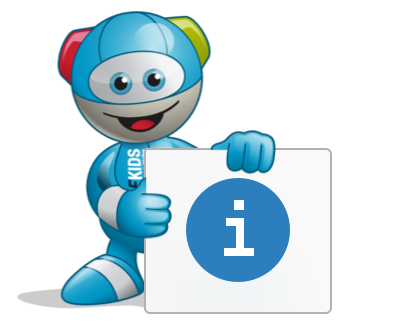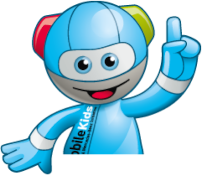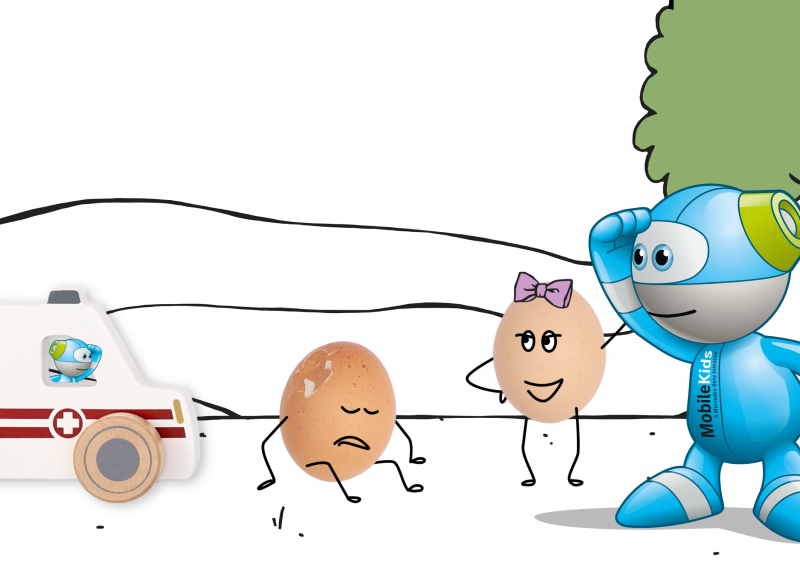Emergencies - in road traffic or anywhere else in everyday life - are exceptional and stressful situations in which every second counts. It is therefore all the more important to stay calm and know exactly how to make an emergency call. But many people, especially children, become uncertain and start to wonder: Is an emergency call appropriate in this situation? Can I get in trouble for a false alarm? Which number do I have to dial? And what questions do I have to answer on the phone anyway? MobileKids provides the answers.
One number for all emergencies
Since 1991, all member states of the European Union have had a uniform emergency number for rescue services and the fire brigade. So you only have to remember one number! If you dial the key combination 1-1-2 in an emergency, you will be helped at any time of the day or night throughout Europe - free of charge. This makes the telephone number probably one of the most important in all of Europe. The problem with this: even after more than 30 years, there are still many people who do not know the Europe-wide emergency number.
A few years ago, the European Commission asked 40,500 EU citizens if they knew which telephone number they could use to make an emergency call. The result was alarming: only 22 percent of respondents knew about 112, while 71 percent gave no answer at all. The remaining participants in the study named other or outdated numbers. It is essential for young and old alike to remember the Europe-wide emergency number in order to be able to react quickly and get help in an emergency.
Vor einigen Jahren befragte die Europäische Kommission 40.500 EU-Bürgerinnen und -Bürger, ob sie wüssten, mit welcher Telefonnummer sie einen Notruf absetzen könnten. Das Ergebnis war erschreckend: Nur 22 Prozent der Befragten wussten von der 112, während 71 Prozent gar keine Antwort abgaben. Die übrigen Teilnehmer der Studie nannten andere oder veraltete Nummern. Dabei ist es für Jung und Alt unerlässlich, sich die europaweite Notrufnummer zu merken, um im Ernstfall schnell reagieren und Hilfe holen zu können.
Je früher, desto besser
Der Rettungsdienst in Deutschland zum Beispiel ist zwar sehr gut ausgebildet und ausgestattet. All das bringt jedoch nichts, solange er nicht vor Ort an der Unfallstelle ist. Je früher also ein Notruf abgesetzt wird, desto schneller kann die Situation von Experten erfasst und das entsprechende Rettungsteam alarmiert werden. Der Notruf ist also ganz entscheidend, damit die Rettungskette in Gang gesetzt werden kann.

While the European emergency number 112 is valid in all member states of the European Union, Iceland, Liechtenstein, Norway, Switzerland, Russia, Ukraine and some other countries in Europe, 911 is the customary emergency number in Canada, Mexico and the USA. In China, on the other hand, there are three different numbers: you can reach the police on 110, the fire brigade on 119 and the emergency medical service on 120. In Australia, you dial 000 in an emergency.
You can find an overview of other emergency numbers in Europe here.
The sooner, the better
The emergency services in Germany, for example, are very well trained and equipped. But all this is of no use at all until they reach the scene of the accident. So the sooner an emergency call is made, the faster the situation can be assessed by experts and the appropriate rescue team alerted. The emergency call is therefore crucial, so that the rescue chain can be set in motion.
At this point it should also be mentioned that it's never wrong to call out the emergency doctor. If you are unsure whether you need an emergency doctor or the fire brigade at all, it's better to pick up the phone once too often than not often enough. After all, the need for a rescue operation is often very difficult to assess if you're not an expert.
But how exactly do you make an emergency call? It's quite simple: when you call 112, a member of the control centre staff answers at the other end. These are trained experts who know exactly what to do and what questions are relevant at this point. In Germany, they often even speak English and, near a border, the language of the neighbouring region as well.

The five W-questions are known, which means that now the practical exercise can take place. Let your child call the emergency number 112 on a toy mobile phone, while you as a parent take the role of the emergency call centre and ask the questions. It is important that your child learns to explain things without using gestures and facial expressions. Repeat this exercise every few months so that your child never forgets how to make an emergency call.
In general, it is advisable at this stage to respond to the questions of the control centre staff. The procedure tends to be the same every time and is based on the five Ws:
- Where did something happen? The most accurate possible information about the accident location (town, district, street, house number, floor, etc.) will help the emergency services to find it as quickly as possible.
- Who is calling? The full name and contact details are given at this point. This gives the emergency services the opportunity to contact the reporting person if further information is needed.
- What has happened? Describe here briefly and concisely what has happened, whether there has been a car accident or a fire, for example.
- What is the situation? In response to this question, information about the number of injured people or the type of injuries evident should be provided. This way, the rescue teams will be better prepared for the assignment.
- Waiting for queries! Afterwards, do not simply hang up, but instead wait for further questions from the control centre. This ensures that nothing has been forgotten.
Following the phone call, the control centre alerts the local rescue services, who then make their way as quickly as possible to the scene of the accident. Even if other emergency services such as the fire brigade or the police were needed, they would be informed by the control centre.


